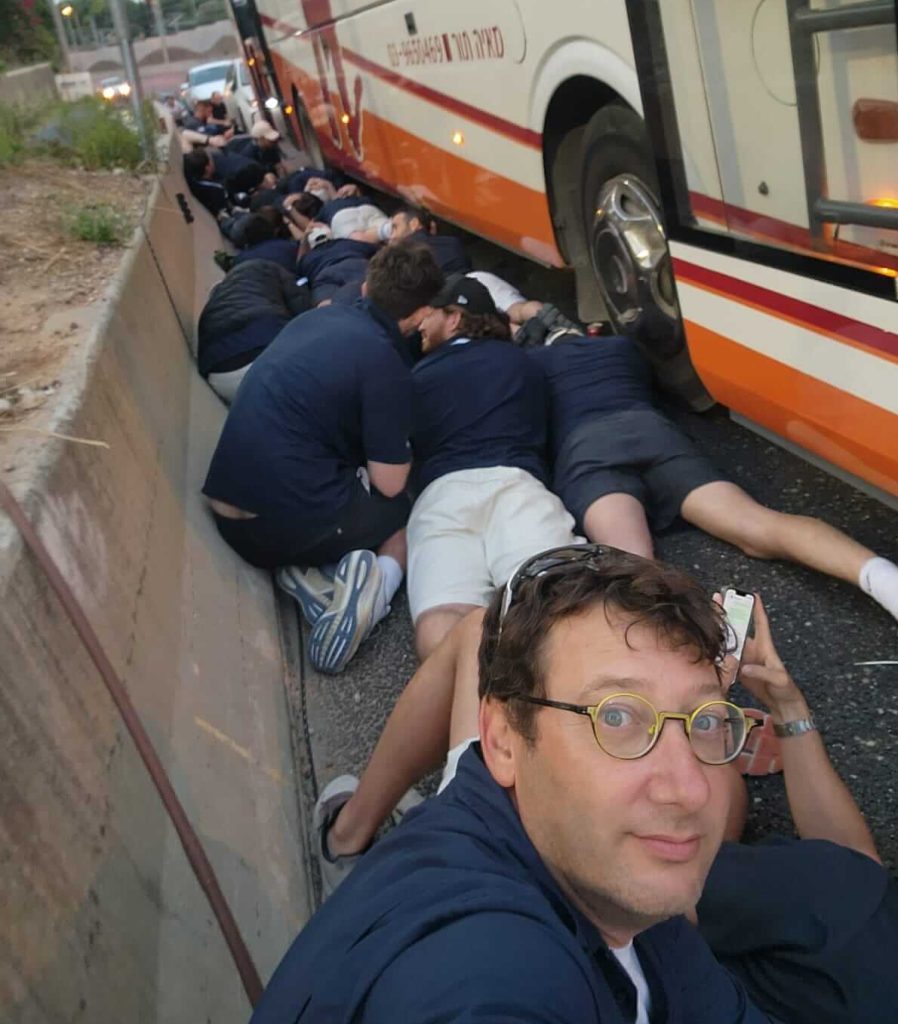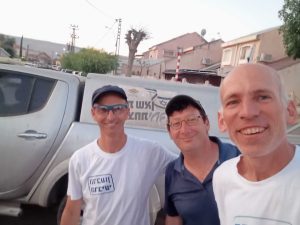Posted on Facebook on June 17, 2025
Let me begin by saying that my family and I are safe. We have access to safe rooms and are following all the rules and regulations.
My thoughts and heart are with the citizens of Israel who have been affected by rocket fire.
We pray for the return of the hostages, and for our soldiers on all fronts — that they come home safely, healthy in both body and spirit.
Israel’s attack on Iran caught me while I was guiding an important group.
We had spent five days traveling the country, hearing from Israel’s military, political, and economic leaders. We visited both the north and the south, witnessing the aftermath of October 7th and listening to firsthand accounts of what took place — and what has followed since. It was a deeply personal and emotional experience.
Needless to say, the escalation of war created a new reality — for both the visitors and for me. As I returned home, they remained under constant attack, trying to find a way to exit the country — and, eventually, to make it back home.
Between the rockets fired at Israel and the devastating news of hits and casualties, I haven’t had much time — especially with trying to explain everything to the kids.
But as the grim reality of war sets in, I’m starting to carve out space for my own thoughts, and to step out and volunteer where I’m needed.
I’m not usually one for short writing — and I feel the need to start giving shape to what’s on my mind. So here it goes. I’ll try.
Threatening Jews or the State of Israel—the only Jewish and democratic state—is not something we take lightly. When an individual, group, or sovereign state makes such a declaration, we become fully alert. Regardless of the reasons or justifications given, the history and outcome of the Shoah—the genocide of Jews during World War II—serve as a stark reminder that such threats must never be ignored. Anyone who witnesses these threats and remains silent risks being seen as a passive collaborator, or as someone who, in hindsight, knew but did nothing.
At the same time, recognizing the seriousness and potential for violence behind such threatening rhetoric—rhetoric often protected by the principle of free speech—has always been a subject of intense debate. Even more challenging is convincing officials and the global public of the urgent need to act on these threats, even when reliable intelligence and evidence show that these groups possess the means to carry them out.
In Israel—both in the army and in civil society—the rules of engagement with firearms are clear, taught thoroughly, and drilled repeatedly until individuals internalize them and can respond accordingly. These rules are based on three simple but critical concepts that must align before engaging: intent, means, and ability.
Intent: There must be a clear declaration or indication of the intent to cause harm—such as shouting “Itbach al-Yahud” (“Kill the Jews”).
Means: The individual must possess a weapon or tool capable of carrying out the threat.
Ability: The individual must be in a position to use that weapon effectively to execute the threat.
This may sound logical and straightforward—but in real life, it can be incredibly complex.
Take, for example, a simple walk through a mixed area where both Jews and Arabs live. It’s clear that not every Arab, regardless of their faith, harbors harmful intent toward Jews. Even if someone is participating in an anti-Israel protest and shouting provocative slogans, that alone does not justify using force. Nor does the mere sight of an Arab carrying a knife bought at the market for cooking purposes.
But what happens when these factors converge?
What if the individual is shouting explicit threats to kill you and is at the same time brandishing a knife or pointing a gun in your direction?
What if they are rapidly approaching, closing the distance between you?
At that point, you’re forced to make a split-second decision.
Can you engage? Should you engage?
The complexity of this decision lies in that very moment—one that can mean the difference between life and death, legality and illegality, restraint and regret.
What happens when the threat does not come from a lone individual with limited resources and capabilities—but from an organized group, a terror organization, a racist movement, or even a sovereign state like Iran? At what point does a threat evolve from mere intent into a clear and present danger, backed by means and ability? Do we wait for that point to arrive? Or can—must—we take preemptive action?
These are not hypothetical questions. When the rhetoric of violence is repeated consistently, when resources are mobilized, weapons are acquired, and operational capabilities are developed, the threat is no longer theoretical. It becomes strategic. And waiting—out of fear, political caution, or legal ambiguity—can prove catastrophic.
History has taught us, especially as Jews, that intent must never be dismissed. When paired with means and ability, it demands action—not reaction. The challenge for any responsible government or society is to determine when that threshold has been crossed—and to have the courage and clarity to act before it’s too late.
Rules of engagement are defined by intent, means, and ability.
If we’ve learned anything from the October 7th Hamas attack, it is that we cannot wait for these elements to turn into action.
Any other approach would be a betrayal of our moral obligation — Never Again.
And that is precisely the situation we are facing with Iran.
Any individual or government moving in this direction must understand: Israel will respond, and will do whatever is necessary to eliminate this threat and ensure the continued existence of the Jewish and democratic State of Israel.
Anyone who takes up a threat like this against Israel or the Jewish people — and anyone who aids or supports them — must know that we will act.
We cannot wait for intent, means, and ability to become action against us.
October 7th reminded us, more than ever: we must confront the threat before it becomes reality.
The endgame is the complete removal of this threat — both through kinetic and political means.
Israel’s strike on Iran was a response to an existential threat — not only to Israel, but to the broader Western world.
Israel has initiated the process; now it is time for the international community to join in and ensure it reaches the necessary conclusion:
the full and final elimination of the Iranian nuclear threat — an existential danger to Israel, the Middle East, and the West.
Since October 7th, people have asked me how to explain Israel — what is often referred to as “Israel advocacy.”
My answer has been clear: meaningful discussion about Israel must begin with a few fundamental understandings.
- The Jewish people have the right to self-determination in the Land of Israel — in a sovereign, Jewish, and democratic state: the State of Israel.
- Hamas is not a legitimate representative of the Palestinian people. It is a terrorist organization committed to the destruction of Israel and a major obstacle to any hope for a peaceful Palestinian future.
- We must now add this: The government of the Islamic Republic of Iran is a genocidal regime with clear hostility toward Israel. This threat must be removed, and Iran should be held fully accountable for the consequences of its aggressive actions.
Acknowledging these three points does not mean agreeing with every action or policy of the Israeli government.
Frankly, I don’t agree with all of them — and Israeli citizens themselves debate nearly everything. But we agree on this: we have the right to exist; the majority of what we do is just and moral — and we can argue, grow, and improve from there.
I encourage anyone engaging in serious conversation about Israel to adopt these three principles — and to ask the same of those they’re speaking with
How do we engage with Israel during these times?
While Israel advocacy is important, I find myself watching the endless stream of “experts” on every news outlet — offering deep dives into each development, analyzing every move, and mapping out the broader geopolitical implications. Wherever I can, and for whomever I can, I strive to be a bridge — helping others understand both Israel’s external challenges and its internal complexities. I’m here for that.
Yet since October 7th, as a guide and Jewish educator, I’ve felt the need to return to the basics — to reconnect with our deep love for the land, its people, and its culture.
I believe this is the foundation of who we are: the Zionist stories and founders, our shared history, and the core values of the state.
As the Declaration of the Establishment of the State of Israel proclaims:
“The State of Israel… will be based on freedom, justice, and peace as envisaged by the prophets of Israel.”
This vision, along with the people and the culture that bring it to life, is what grounds us — especially in times like these.
About a month ago, when I sat down to write a campaign for my new book, I wrote:
“The book “Dates Shall Come Again” was written during my reserve army service in the IDF, right in the heart of the Iron Swords War. It was a time when I felt a deep need to reconnect with the pride of our identity — with our values, our roots, and the achievements of the Jewish people in the Land of Israel.
This story was born out of love — a deep passion for the land I call home. A land with thousands of years of rich history, breathtaking landscapes, and a beautiful mosaic of cultures and communities. Israel truly is a place like no other.”
Please take a moment to read about my new book and pre-order it here:
https://headstart.co.il/project/84817?lang=en
As an educator, I believe this is a time to reconnect with our story — to be inspired by all we have built, and by the bright future that lies ahead, thanks to the IDF, who are working tirelessly, day and night.
I hope this inspires you, too, to take a moment and revisit some of the powerful, timeless stories of the Jewish and Zionist journey. Sometimes, a good old story is exactly what we need to remember who we are.
Am Yisrael Chai.




